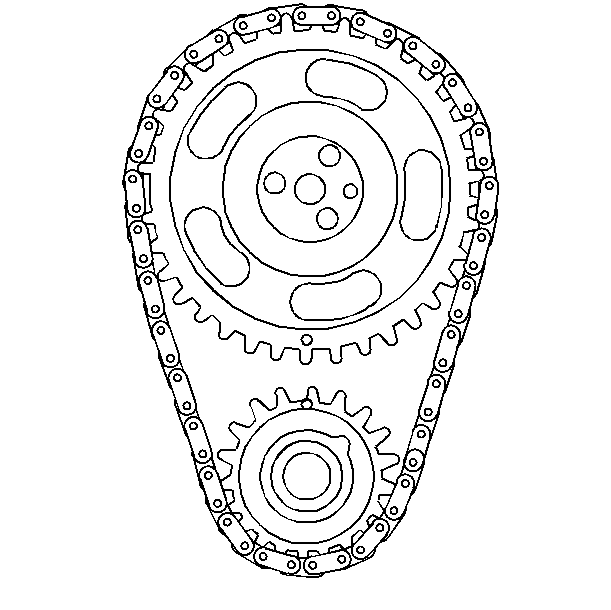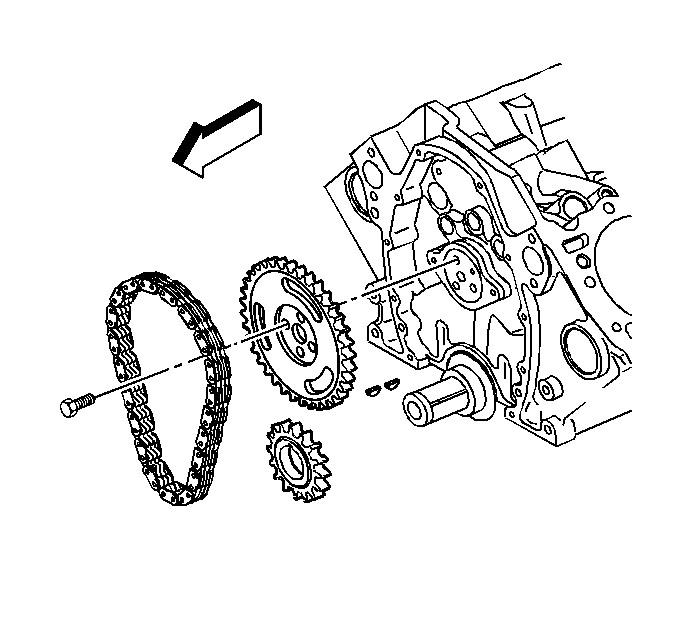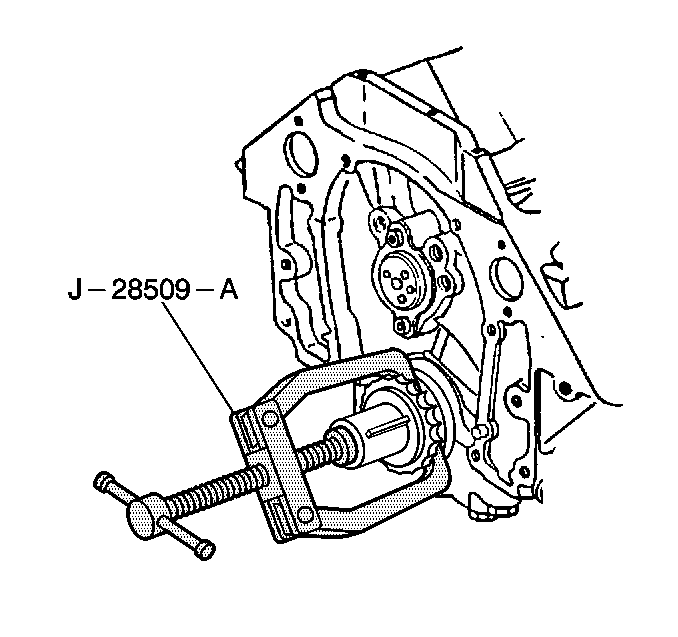Removal Procedure
Tools Required
J 41371 Reluctor Wheel Remover.
J 28509-A Crankshaft Sprocket Remover
- Disconnect the negative battery cable.
- Drain the cooling system. Refer to Cooling System Draining and Filling in Engine Cooling.
- Remove fan shrouds from the radiator. Refer to Fan Shroud Replacement in Engine Cooling.
- Rotate the engine until the timing marks on the crankshaft balancer and the engine front cover are on TDC.
- Remove the drive belt from the vehicle. Refer to Drive Belt Replacement in Engine Cooling.
- Raise the vehicle and support with safety stands. Refer to Lifting and Jacking the Vehicle in General Information.
- Remove the Crankshaft Position Sensor. Refer to Crankshaft Position Sensor Replacement in Engine Controls.
- Remove the crankshaft balancer from the crankshaft. Refer to Crankshaft Balancer Replacement .
- Remove the water pump from the engine block. Refer to Water Pump Replacement in Engine Cooling.
- Remove the engine front cover from the engine block. Refer to Engine Front Cover Replacement .
- Align the timing marks on the camshaft and crankshaft gears.
- Remove the crankshaft position reluctor ring. Refer to Crankshaft Position Sensor Reluctor Ring Replacement .
- Remove the camshaft sprocket retaining bolts.
- Remove the timing chain and camshaft sprocket.
- Use the J 28509-A to remove the crankshaft sprocket.
Caution: Unless directed otherwise, the ignition and start switch must be in the OFF or LOCK position, and all electrical loads must be OFF before servicing any electrical component. Disconnect the negative battery cable to prevent an electrical spark should a tool or equipment come in contact with an exposed electrical terminal. Failure to follow these precautions may result in personal injury and/or damage to the vehicle or its components.



Installation Procedure
Tools Required
J 22102 Crankshaft Sprocket Installer
- Use the J 22102 in order to install the crankshaft sprocket.
- Ensure the timing marks are aligned and install the timing chain and sprocket to the camshaft.
- Install the camshaft sprocket retaining bolts to the camshaft.
- Install a new crankshaft position reluctor ring to the crankshaft. Refer to Crankshaft Position Sensor Reluctor Ring Replacement .
- Install the engine front cover to the engine block. Refer to Engine Front Cover Replacement .
- Install the Crankshaft Position Sensor. Refer to Crankshaft Position Sensor Replacement in Engine Controls.
- Install the crankshaft balancer to the crankshaft. Refer to Crankshaft Balancer Replacement .
- Install the water pump to the engine block. Refer to Water Pump Replacement in Engine Cooling.
- Remove the safety stands and lower the vehicle.
- Install the drive belt to the vehicle. Refer to Drive Belt Replacement in Engine Cooling.
- Install the fan shrouds to the radiator. Refer to Fan Shroud Replacement in Engine Cooling.
- Fill the cooling system. Refer to Cooling System Draining and Filling in Engine Cooling.
- Connect the negative battery cable.
Important: Ensure the following conditions exist:
• The camshaft and the crankshaft timing marks are aligned • The camshaft dowel pin and the camshaft sprocket holes are properly
aligned • The gears and the chain mesh properly

Notice: Do not hammer the camshaft sprocket onto the camshaft. To do so may dislodge the rear camshaft plug and damage the camshaft.
Notice: Use the correct fastener in the correct location. Replacement fasteners must be the correct part number for that application. Fasteners requiring replacement or fasteners requiring the use of thread locking compound or sealant are identified in the service procedure. Do not use paints, lubricants, or corrosion inhibitors on fasteners or fastener joint surfaces unless specified. These coatings affect fastener torque and joint clamping force and may damage the fastener. Use the correct tightening sequence and specifications when installing fasteners in order to avoid damage to parts and systems.
Tighten
Tighten the retaining bolts to 30 N·m (22 lb ft)
Important: The old crankshaft position reluctor ring sensor must not be reused.
Caution: Unless directed otherwise, the ignition and start switch must be in the OFF or LOCK position, and all electrical loads must be OFF before servicing any electrical component. Disconnect the negative battery cable to prevent an electrical spark should a tool or equipment come in contact with an exposed electrical terminal. Failure to follow these precautions may result in personal injury and/or damage to the vehicle or its components.
